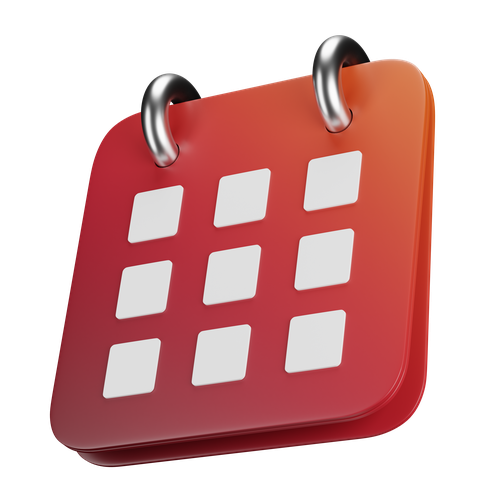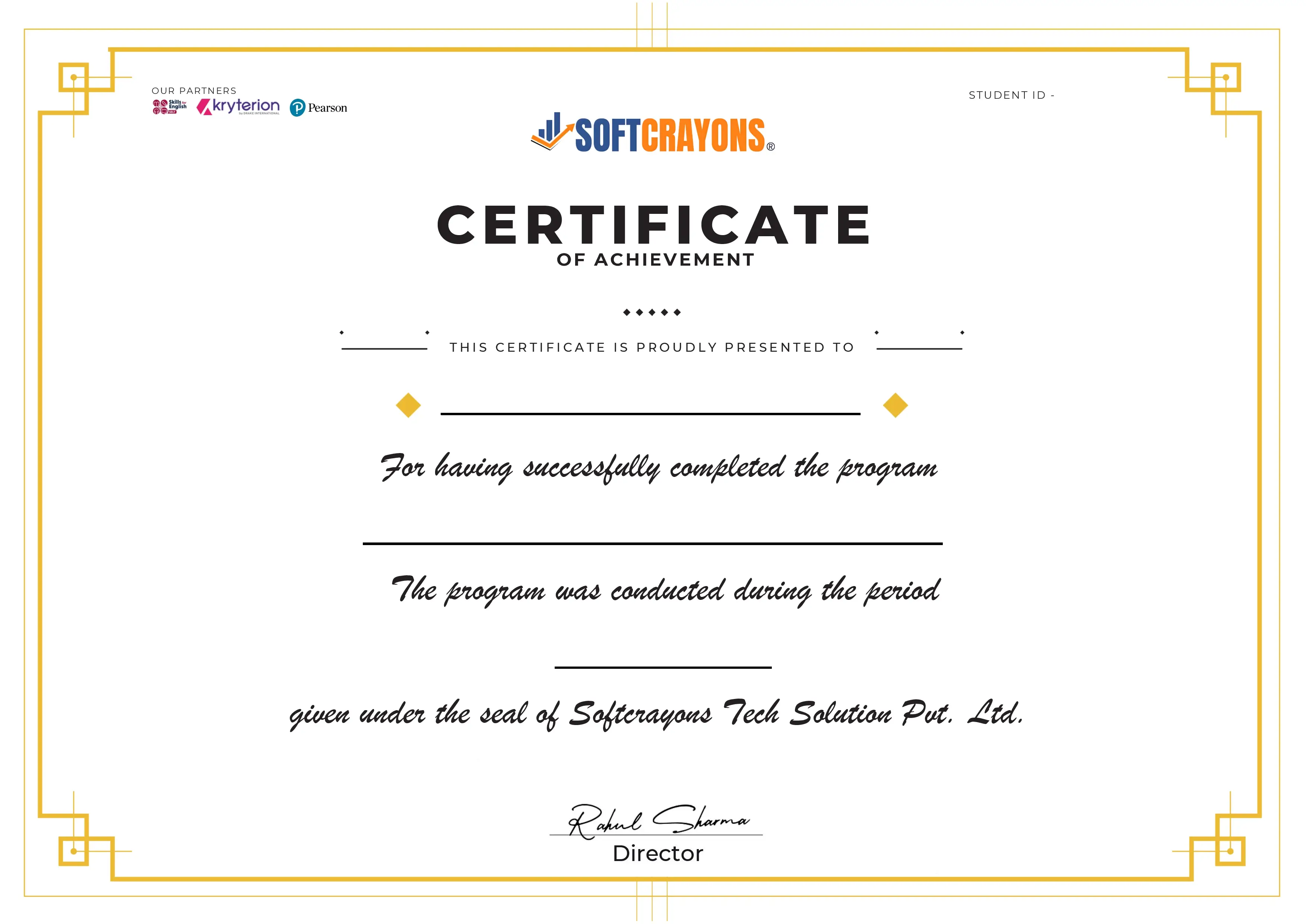Django
"Innovate. Integrate. Inspire The Future with SoftCrayons"
SoftCrayons Tech Solution is the best Django Python Training Institute in Ghaziabad.
We offer Django tutorials designed by certified professional industrial trainers with 8+ years of experience.
Learn, Build Skills, Grow Limitlessly. Your IT Career Starts Here.

Course Duration
2 month - 3 month

New Batch
As per schedule hybrid mode

Payment
Flexible One-Time/Installment

Mode
Flexible Offline/Online
Professional Skill Development
Service Details
Best Django Python Training in Ghaziabad
SoftCrayons Tech Solution is the best Django Python Training Institute in Ghaziabad.
We offer Django tutorials designed by certified professional industrial trainers with 8+ years of experience.
Our skilled instructors teach the entire core and advanced Django. We provide the global certification after completing the whole course and assignments.
Even if you are fresher with no background in the IT field, learning Django Web Framework will help you to make a promising career in the IT domain.
You are most welcome to Softcrayons Tech Solutions if you cannot find web development and application work after completing degree courses.
We provide industry-standard Django Python training courses and work on Live projects with industrial experts.
All our enrolled candidates are confident enough that they would be placed in significant MNCs after completing the course.
We have tutorials for all technical skills and programming languages like core Python, advanced Python, Django Framework, Data Science, Machine Learning, and many more.
Our course module covers all the issues when working in the industry.
Python is a solid object-oriented programming language. Python is a scripting language. Python interpreters are available in all operating systems.
Python interpreters allow Python code to run on a wide range of platforms. Python code is packed as executable apps using third-party tools like Pyinstaller and many more.
Why Django Python Training?
Overview of Django
As it is open-source, Django is a general framework.
Django is a web framework based on Python and follows the MVC architectural paradigm.
The Django Software Foundation is an independent organization that maintains all its tools, algorithms, functions, and updates.
Other frameworks, like Pyramid, web2py, Flask, etc., assist developers in building sophisticated projects. Ajax-based apps can be developed using Pyjamas and IronPython from the client side.
Django is a Python web framework that allows you to create safe websites easily.
Experienced developers build Django. It is free and open-source. It has a vibrant and active community with perfect documentation. It has various free and paid support options.
Django helps you in creating software that is:
Since everything is included in one "product," it functions flawlessly. It adheres to the same design principles with comprehensive and up-to-date documentation.
Django is versatile enough to create any website form, content management system, social networking site, etc.
It can integrate with any client-side framework. It can serve material in any format like HTML, RSS feeds, JSON, XML, etc.
At Softcrayons Tech Solution, you will learn all the basics of Django-Python, as it is the best Django Python training institute in Ghaziabad.
Django provides a framework engineered to avoid many common security blunders.
Django avoids many pitfalls, like storing session information in cookies. It directly stores passwords rather than a password hash.
Django employs a shared-nothing architecture based on components.
Every part of architecture is independent of others. Each piece can be easily replaced or changed if required.
The various components of Django are separated so it can easily accommodate additional hardware like caching servers, database servers, application servers, etc.
Django programming is created with such design principles so that it is easy to maintain and reuse the code of Django.
It eliminates needless repetition and thus reduces the amount of code as it employs the Don't Repeat Yourself philosophy.
Django encourages the grouping of comparable functionality into reusable applications. It also promotes the set of related code into modules at a lower level.
Django is developed in Python, which can quickly run on all types of platforms.
That means you're not locked into a single server platform and can run your apps on various Linux, Windows, and Mac OS X flavours.
Django is well-supported by web hosting companies that provide dedicated infrastructure for hosting Django sites.
What was the source of it?
Django was built by a web team establishing and maintaining newspaper websites during 2003-2005.
After developing a few sites, the group began to factor out design ideas by reusing many of the same code.
The developed shared code was then made into the "Django" web development framework and was released as an open-source in July 2005.
Django has dramatically improved since its initial release from 1.0 to the latest version, 3.1. in 2020.
Each release has updated new functionality and bug fixes. It supports new types of databases, template engines, caching, and generic view methods and classes.
You will learn all the updates in the best Django Python training course in Ghaziabad at Softcrayons Tech Solution.
How well-known is Django?
There isn't an accurate way to measure the popularity of server-side frameworks.
The most important question is if Django is enough to escape the problems with unpopular media. Is it still developing? Is it still progressing? Is it feasible to ask for help if you need it? Is there any reward for learning Django?
Yes, Django is a popular framework. It is well evidenced by the large number of websites that use it and the large number of people who contribute to the codebase by providing free and paid support.
Many big and high-profile websites like Instagram, Mozilla, National Geographic, Pinterest, OpenStack, and much more use Django.
Is Django self-assured?
Web frameworks are generally described as "opinionated" and "unopinionated". Opinionated frames have the correct method to complete a task.
The right way to accomplish something is generally well-understood and well-documented; they facilitate rapid development in a single area.
They are less adaptable while tackling issues outside their primary area because of very few options for components and techniques.
Unprejudiced frameworks have far fewer restrictions on how to link components to achieve a purpose. They make it easy for developers to use the best tools.
Django is a little opinionated. It includes a set of components for most development jobs.
Django decoupled architecture allows you to choose from a variety of alternatives.
Course Benefits
Why should you learn Django from the best institute of Django Python training in Ghaziabad?
Django allows you to get started with minimal setup.
It's become the most popular framework in the world due to its ease of use and ability to speed up development. You can easily make a website within hours.
Django is a single-page application framework. It is database agnostic, meaning you can use any database.
Django is a Python web application framework. Developing web programs without dealing with many difficulties is simple and easy.
So grab the best learning opportunity from the best Django Python training institute in Ghaziabad at Softcrayons.
Related Courses...
Python Full Stack Development
Python Full-stack development courses teach you how to build web applications' front end and back end using Python, often with frameworks like Django or Flask on the back end and technologies like HTML, CSS, and JavaScript for the front end.
Data Science & Machine Learning Using Python
Our Data Science & Machine Learning Using Python course provides a comprehensive introduction to the dynamic field of data science and machine learning. Taught by industry experts, this program covers essential Python programming skills, data manipulation with libraries like NumPy and Pandas, and machine learning techniques using sci-kit-learn. Students gain hands-on experience with real-world datasets, honing their data analysis and modelling skills.
Data Analytics Using Python
The Data Analytics Using Python course is designed to empower individuals with the skills needed to extract valuable insights from data. Through hands-on training, participants learn Python programming, data cleaning, exploration, and visualization using libraries like Pandas and Matplotlib. The course also covers statistical analysis, hypothesis testing, and data modelling, enabling students to make data-driven decisions.
Machine Learning With Python
Machine Learning With Python course is your gateway to mastering the exciting world of artificial intelligence and machine learning. Through this comprehensive program, you'll gain a deep understanding of machine learning algorithms, data preprocessing, model evaluation, and deployment using Python. Whether you are a novice or an experienced programmer, our expert instructors will guide you through hands-on projects and real-world applications.
Data Science Using Python
Data Science Using Python course is your gateway to a career in one of the most in-demand fields today. This program equips you with essential skills in Python programming, data manipulation with Pandas, data visualization with Matplotlib, and statistical analysis. You'll learn to extract actionable insights from complex datasets and develop data-driven solutions. Join us to unlock the potential of data science and embark on a journey of discovery, analysis, and innovation using Python as your tool of choice.
Core Python
Discover the essentials of Python programming with our Core Python course. Designed as the ideal starting point for beginners, this program introduces you to Python's fundamental concepts. You'll delve into Python syntax, data types, loops, and functions through hands-on exercises and practical examples. Whether you aim to initiate a programming career or expand your skill set, this course equips you with a strong Python foundation.
Network Programming Training: Mastering Network Communication
Explore the world of network programming through our comprehensive training program. Designed for aspiring network engineers and developers, this course offers a deep dive into network protocols, socket programming, and network security. You'll gain hands-on experience creating network applications, implementing client-server communication, and ensuring data integrity. Our expert instructors will guide you through real-world scenarios and practical exercises, equipping you with the skills needed to excel in Ghaziabad's dynamic field of network programming training.
Python for DevOps:
- DevOps professionals use Python for tasks like automation, configuration management, and deployment. Courses in this category teach you how to use Python in a DevOps Training environment.
Training Features
Live Interactive Classes
Real-time doubt clearing with expert instructors
Hands-on Projects
Build portfolio with industry-standard projects
Industry Curriculum
Updated syllabus matching current job requirements
Latest Technologies
Learn cutting-edge tools and frameworks
Online & Offline
Flexible learning modes to suit your schedule
Certification Support
Prepare for global IT certifications
LEARNING PATH
Master the Syllabus
Program Highlights

Top Faculty with Certification Facility
Learn from the best, as we impart world-class education with faculty who have rich academic & industry experience

Career Service: Job Readiness
Pursuing your desire to being job-ready through resume building sessions & MasterClass for interview preparation

Choose the way you want to learn
Enhance your learning potential by your choice of printed books, audio books, e-books, videos, and live classrooms

Placement Guarantee
Benefit from our network of over 500+ hiring partners from diverse domains to ensure a smooth job transition after 1 year
Common Questions
Upon successful completion of the program, your certificate will be emailed to you in a digital format. You can also download it from your Softcrayons account.
This advanced certificate course in cloud computing provides you with in-depth knowledge and hands-on experience in cloud technologies, preparing you for high-demand roles in the industry.
If you miss a lecture, you can access the recorded session on the Softcrayons platform. Additionally, you can reach out to our support team for further assistance.
This training prepares you for various cloud certification exams, such as AWS Certified Solutions Architect, Microsoft Azure Fundamentals, and Google Cloud Professional certifications.
We offer a 7-day money-back guarantee. If you're not satisfied with the program, you can request a refund within 7 days of enrollment, subject to our terms and conditions.
Yes, Softcrayons offers a batch deferral policy. You can defer your batch to a later date if you're unable to attend the current session, subject to availability.
Join Our Django Training In Ghaziabad
Guranteed Job Placement Program
- Expert-led training
- Hands-on projects
- Globally recognized certification
Training Certification
🎓 Earn Your Certificate
Successfully complete the training and assessments to receive your official certification. This credential validates your skills and enhances your career opportunities.
Showcase your achievements and share your milestones with your network to inspire others and grow your professional connections.

Interested in this Program? Secure your spot now!
Upcoming Batches
Program Induction
Program Induction
Interested in this Program? Secure your spot now!
What People Say About Us
Himanshu Tyagi
I have completed the course in 3-4 months of DIGITAL MARKETING training under the guidance of Experts Trainers. It was the best experience to learn under them and their teaching methods are out of the box. Best institute for professional courses and a great place. and very cooperative company with helpful staff.
